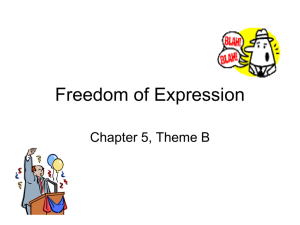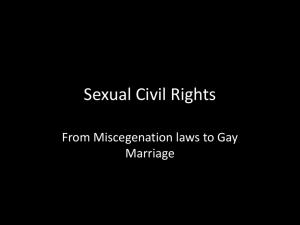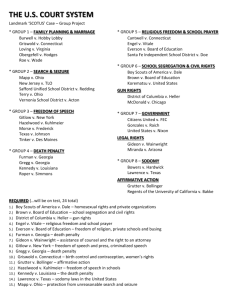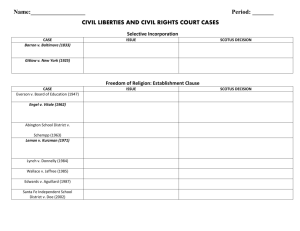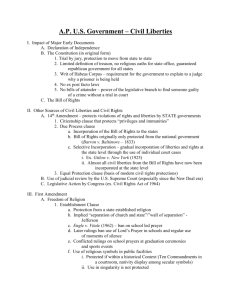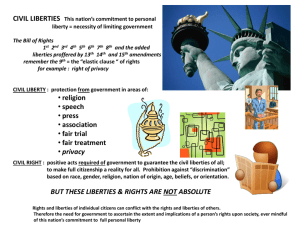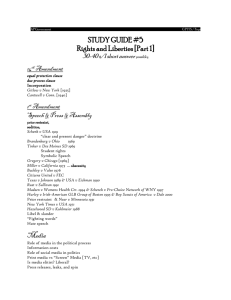Civil Liberties Powerpoint from Class
advertisement
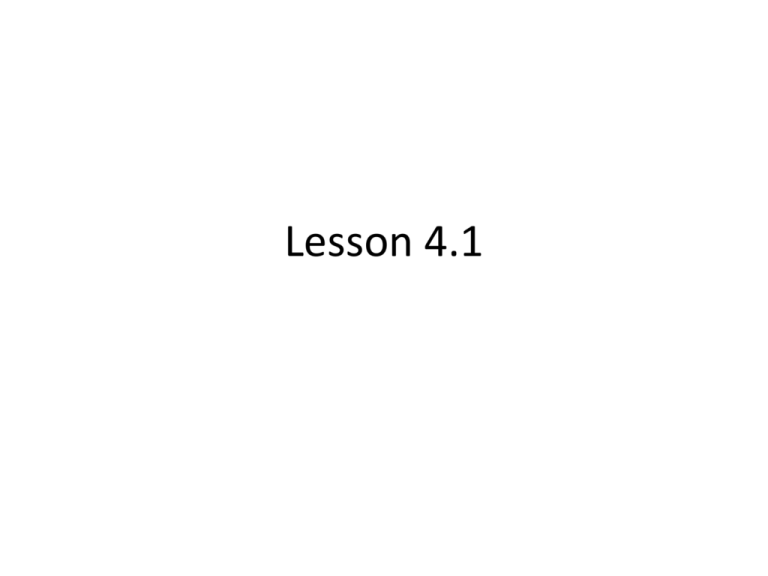
Lesson 4.1 Opening Story • College students sued for being forced to pay a fee to pay for clubs they disagree with – Said it violated their freedom of expression (speech) • SCOTUS said as long as the college let them voice their problems with who should get funding, it was okay for the college to do it • Shows the complexity of civil liberties – Not cut and dry • Conservatives want small gov – But are cool with gov allowing prayer in school or banning abortion • Liberals want big gov – But want to religious displays by the gov and to reign in the gov regarding criminal justice Civil Liberties • Protections against government actions – “Civil liberties are rights and civil rights are laws” • Civil liberties are found in the Bill of Rights • Lots of civil liberties questions go to SCOTUS – SCOTUS must decide who’s rights are more important The Bill of Rights • Promised to the anti-federalists if they would ratify the Cons • Cons signed in 1787 (11 years after 1776) • BoR ratified in 1791 – 4 years without civil liberties (ouch) Bill of Rights Then and Now • The abuses of the British to American (British) subjects made for many of the civil liberties protected in the BoR – Jailed newspaper editors – Arrested ppl w/o cause – Detained ppl w/o informing them of the crime • Now, most ppl support the BoR in theory but not in practice – Cool with everyone having civil liberties until they disagree with those ppl – Can the KKK hold a rally in your neighborhood? Teach about atheism or homosexuality at school? Freedom v. Security • Liberals will sacrifice some security for more freedom • Opposite for conservatives • Examples: • Airport screenings • Speeding • Searching suspected criminals The Bill of Rights and the States • First Amendment starts with “Congress shall make no law…” – BoR are all about restricting the power of the federal gov • Barron v. Baltimore – Baltimore dumped a bunch of sand in the harbor messing up Barron’s wharf – Barron sued saying his 5th Amendment rights were violated (due process) – SCOTUS said that the BoR was only talking about the fed gov, not the states (this is probably bull crap, btw) • 14th Amendment changed that and said neither the fed or state govs could violate ppl’s “equal protection of the laws” Gitlow v. New York • Gitlow was arrested by the state of New York for publishing a socialist newspaper that encouraged ppl to overthrow the gov • He said that no one tried to overthrow the gov, so he was arrested just for his words and he had the right thanks to the 1st Amendment • SCOTUS agreed with Gitlow and said “THE FIRST AMENDMENT APPLIES TO THE STATES TOO” (Take that, Barron v. Baltimore!) – Protected by the “due process” clause of the 14th Incorporation • SCOTUS said that most of the BoR civil liberties that originally only applied to fed govs, now includes the state govs too. – “Incorporated the freedoms into the states” • Big starting point was Gitlow • Most civil liberties in the BoR are now incorporated Freedom of Religion • Establishment clause: “Congress shall make no law respecting an establishment of religion.” – US can’t make an official religion • Free exercise clause: “or prohibiting the free exercise thereof” – US can’t stop you from practicing your religion The Establishment Clause • Happened b/c England switched official religions a lot (prot and cath) • “Separation of church and state” NOT IN THE CONSTITUTION – Said by Jefferson “wall of separation” – Kinda in the establishment clause Religion and Education • Lemon v. Kurtzman – can gov give money to private catholic schools? Does that violate the establishment clause? – Does it pass the “Lemon Test”? • Is the money spent on secular stuff? (textbooks, testing) (stuff gov knows is secular) • Does the money cause an “unnecessary entanglement between gov and religion”? – Big deal: is the gov paying to help a religion? Religious Activities in Public Schools • Schools can be used for religious activities if… • Still contention about providing funds to schools that teach “alternatives” to the theory of evolution School Prayer • ENGLE V. VITALE (big deal) • Principal read this over the PA each morning: – "Almighty God, we acknowledge our dependence upon Thee, and we beg Thy blessings upon us, our parents, our teachers and our country. Amen.” • Said it was “non-denominational” • Is this a violation of the establishment clause? • SCOTUS says yes. More on School Prayer • You can pray in school, but if the teacher leads it, they are promoting one religion. • Class or school-wide prayer is unconstitutional. Why? • Many schools ignore the prayer rule – Ppl won’t fight it • Some conservatives push for an amendment permitting prayer in school • Majority of Americans support school prayer – If the prayer is in their religion Evolution • Scopes Monkey Trial – Not a SCOTUS case – 1920s Tennessee – Scopes found guilty of violated a no-evolution law, then overturned • SCOTUS said in 1968 that schools can’t ban teaching evolution • States and schools continue to try to get around this Public Displays • 2005 SCOTUS said two KY court houses couldn’t display the Ten Commandments w/o other religions being displayed • Christmas trees and Santa are cool • Not the nativity • Why? • “The Court’s basic position is that the Constitution does not require complete separation of church and state; it mandates accommodation of all religions and forbids hostility toward any. At the same time, the Constitution forbids government endorsement of religious beliefs” 4.1 Quiz A 1. In which state was the display of the Ten Commandments banned at a courthouses? 2. What was Engle v. Vitale about? (two words) 3. Which amendment has the “due process” clause? It says that all citizens must be treated equally by the states and the fed gov. 4.1 Quiz B 1. The incorporation doctrine is about incorporating the Bill of Rights into the ___________. 2. Which clause in the First Amendment says the government can’t make an official religion? 3. Which SCOTUS case said private or religious schools can get public funding if it is used for secular stuff? Lesson 4.2 Free Exercise Problems • Free exercise clause says: Congress can’t “… prohibiting the free exercise thereof” • Some religions say to take drugs • Ali said Islam barred him from Vietnam • Amish refuse public schools for kids • Jehovah’s Witnesses refuse blood transfusions General Free Exercise Rule • Interpretation of the free exercise clause: You have the right to believe what you want, but not necessarily to practice how you want • Human sacrifice is not cool – SCOTUS Employment Division v. Smith • Native Americas were fired for failing a drug test for peyote (an illegal drug used in religious ceremonies) • Employment Division of Oregon denied them unemployment benefits – Can’t get unemployment if you are fired, only laid off • SCOTUS agreed with Oregon What about animal sacrifice? • Who would support the practitioners? • Who would be against them? 4.2 Quiz A 1. Why were the employees fired in Oregon v. Smith? 2. Why did Muhammad Ali refuse to go to Vietnam? 3. Name one thing that Jehovah’s Witnesses may object to. 4.2 Quiz B 1. Which country has the highest tolerance for religious extremists? 2. What part of the First Amendment concerns protecting the beliefs and practices of peoples’ religions? 3. How did Muhammad Ali’s faith get him in trouble with the federal government? Lesson 4.2 Edwards Rules! • “A democracy depends on the free expression of ideas. Thoughts that are muffled, speech that is forbidden, and meetings that cannot be held are the enemies of the democratic process. Totalitarian governments know this, which is why they go to enormous trouble to limit expression.” Freedom of Expression • Expression – express yourself – Say and publish your beliefs • Freedom of expression is not absolute – You can’t shout fire in a crowded theater • Hate speech – speech used to injure a person Prior Restraint • Prior restraint – when a gov stops something from being published – AKA censorship – They must let it be published and then punish if needed • Near v. Minnesota – newspaper was shut down because it was going to call officials “Jewish gangsters” – It was going to be libel, which is illegal – But prior restraint is punishment before a crime is committed • Nixon tried to keep the NYT from publishing stolen records – SCOTUS said, nice try, Richie! That’s prior restraint and prior restraint “aint” cool. Prior Restraint in Schools • Schools can use prior restraint • Pretty much any right that the federal government can’t violate, schools can • Search and seizure, speech, press, putting soldiers in your locker Free Speech and Public Order • Schenck v. US – Schenck was passing out flyers telling ppl to dodge the draft for WWI – Put in jail – SCOTUS said it was cool because he cause a “clear and present danger” to the US • McCarthyism/Red Scare – communists jailed for creating a clear and present danger – More like fire in an empty theater…amirite? • Since then, you can say “overthrow the gov” unless you tell your plan Obscenity • Roth v. US – Roth appealed after being jailed for mailing pornography • SCOTUS upheld his jailing saying “Obscenity is not communication and is without social value.” • Miller v. California – Miller accidentally mailed some pornography to a guy and his mother. They were angry. – Led to the “Obscenity Test” • Is it vulgar? • Is it offensive? • Is it not art? Obscenity • What is obscene is decided by the community – It can be different in different places • Sex is definitely obscene, but violence never is. 4.3 Quiz A 1. Which SCOTUS case led to a test of what is obscene and what is not? 2. What was Schenck trying to get people not to do? 3. Prior restraint is punishing someone for publishing something ______________. 4.3 Quiz B 1. What kind of speech is considered not to be protected? It is usually about sexual or vulgar subjects. 2. You shouldn’t shout fire in a crowded __________. 3. Which SCOTUS case was about prior restraint? 4.4 122-126 Libel and Slander • Defamation – to defame – Something that damages a person’s reputation • Libel is written (library) • Slander is spoken (slur) • New York Times v. Sullivan – NYT printed that MLK was arrested falsely by Sullivan (Montgomery, AL City Commissioner) – Sullivan sued for libel – SCOTUS said public figures must prove that what is written is false and intended to defame – Almost impossible to prove More Libel and Slander • Private individuals must just prove that the speaker/writer was negligent – Much easier to bust for slander/libel against private individuals • Hustler v. Falwell – smh – Larry Flint (porno guy) v. Jerry Falwell (TV evangelist) – Falwell sued for libel and lost b/c he is a public figure Symbolic Speech • Tinker v. Des Moines – students wore black armbands to protest Vietnam. They were suspended. – SCOTUS overturned the suspension – SYMBOLIC SPEECH (actions that aren’t writing or speaking) IS PROTECTED • Remember Texas v. Johnson Free Press and Fair Trials • Press wins every time • Public trials keep everything transparent • Only can sequester (lock in) the jury Commercial Speech • Commercial speech – advertising • Federal government regulates it more because of the “Commerce Clause” – Says federal government has control over anything that has to do with commerce • Regulated by the FTC (Federal Trade Commission) – Decides what kinds of ads are approved for TV and radio • Can regulate TV and radio because anyone can see it. You don’t have to pay for it. • GENERAL RULE – YOU CAN ADVERTISE IT IF IT IS NOT MISLEADING OR ILLEGAL Regulation of the Public Airwaves • Regulated by the FCC (Federal Communications Commission) • Has power due to the commerce clause • Only has power over broadcasting – information that anyone can see • Not narrowcasting – info that you have to pay for or go to great lengths to see • Broadcasting is only network TV (over the air) and radio • Narrowcasting includes Internet, cable TV, satellite • Miami Herald v. Tornillo – Supreme Court said a newspaper didn’t have to give free space for candidates to respond to criticisms • George Carlin – comedian that talked about the Seven Filthy Words you can’t say on TV – A radio show tried to say them and the FCC fined them – Supreme Court said that broadcasting obscene materials took rights away from those who were offended or kids • Remember, FCC can only regulate things that are free and for everyone, not things you pay for like HBO, satellite or websites Campaigning and Free Speech • Buckley v. Valeo (1970s) said that spending money to influence elections was protected free speech • McCain-Feingold (2002) banned soft money (money given to a party, but ends up going to candidates anyway) but that sort of took the rights of “speech through money” away from some businesses • Citizens United v. FEC (2010) said that money is speech and citizens (and corporations) can donate what they want 4.4 Quiz A 1. What did Miami Herald v. Tornillo say newspapers didn’t have to do? 2. Which federal regulatory agency regulates the airwaves of television and radio? 3. Why did Mary Beth Tinker get arrested? 4.4 Quiz B 1. What couldn’t George Carlin say on the radio? 2. Which federal regulatory agency regulates commercials? 3. What type of speech is not written or spoken? It was protected in Texas v. Johnson. 4.5 126-130 Freedom of Assembly • 2 main freedoms here – Freedom to meet together and protest – Freedom to form groups like interest groups and parties • Assemble means to gather • Can’t assemble if – You disrupt traffic, public order – Because your rights end where mine begin Fred Phelps and the Westboro Baptist Church • Protested at soldiers’ funerals • Saying their deaths were caused because the US is okay with gay people • Right to protest upheld, although most people hate them To Protest • You have to reserve the spot and time • You might have to pay a security deposit saying you won’t break anything • You have to respect the rights of others • Remember – when protesting becomes harassment, you lose your right to protest – Harassment – feeling of intense annoyance • Can’t protest at peoples’ houses Nazis have rights too. • City in Illinois charged Nazi group $3000 for a security deposit • Nazis sued, ACLU backed them up • Supreme Court said the fee was too much and made to take their First Amendment rights away • ACLU lost half their Illinois membership NAACP v. Alabama • Alabama state government tried to make NAACP turn over their membership list • NAACP refused and won in the Supreme Court The Second Amendment: NRA • National Rifle Association • Biggest interest group concerning gun rights • Fight almost all gun control efforts – Views these efforts as a way for the government to take away guns that will leave the people helpless if the government becomes tyranical Gun Control Lobby • Believe that the Second Amendment only pertains the rights of citizens to raise armies for protection • Say there is no need for guns today • At the very least, they want assault rifles banned and a national gun registry DC v. Heller • DC banned residents from owning handguns – Except military and cops and ex-cops – Said 2nd Amendment only allowed guns if you were in a militia • • • • Supreme Court said “Aww Heller no!” Said DC overstepped its power Said ppl could own guns for personal protection Said ppl didn’t have to have guns disassembled because that defeated the purpose of self protection. Gun laws that do exist • Some state and local governments have… – Banned concealed weapons (weapons hidden in clothing) – Gun ownership by felons or crazy people • (probably a good idea) – Banned guns in government and school buildings – Banned “dangerous and unusual” weapons • AKA weapons that are awesome and fun 4.5 Quiz A 1. Which amendment concerns gun laws? 2. Which group was asked by Alabama (shocker) to give up its membership list? 3. What happened to ACLU membership in Illinois after they defended Collins in Collins v. Smith? 4.5 Quiz B 1. Which SCOTUS case concerned a city banning handguns? 2. Why did the Nazis want to march in Skokie, IL? 3. Which state tried to force the NAACP to give them their membership list? Defendants’ Rights • 4-8 – Justice is great! • Created to protect the accused from a corrupt government – Came out of colonial rule of the British 4th (Search and Seizuure) • To search or seize (take) cops need probable cause – Reasonable grounds to believe that someone is guilty of a crime • Sometimes need a warrant – Letter written by a judge allowing them to search and/or seize • Sometimes don’t need a warrant – If someone is in danger, the cop, the suspect, a victim Times Search and Seizure is cool • • • • Aerial searches for pot fields Roadside drunk driver checkpoints Drug sniffing dogs Stop and frisk – big deal – Overturned in NYC last year Times Search and Seizure is not cool • • • • If there is no danger to the cop’s safety If they aren’t a suspect of a different crime Highway checkpoints for “any crimes” GPS on suspects’ cars Exclusionary Rule • Evidence found illegally is EXCLUDED from evidence in a trial • Starts with Weeks v. US – Weeks was committing lottery ticket fraud – An illegal search turned up evidence against him – SC said they couldn’t use the evidence • Incorporated to the states with Mapp v. Ohio – Cops searched a woman’s house for a fugitive with a fake search warrant – Found some “obscene material” – Charged her with having obscene material – SC said evidence had to be EXCLUDED Exclusionary Rule • Critics say it lets criminals go based on a technicality • Proponents say everyone is innocent until proven guilty Good-faith exception • If a cop finds evidence illegally but didn’t know he was searching illegally, it stands The War on Terror and Civil Liberties • After 9/11, Congress passed The Patriot Act – It increased the power of the federal government to find suspected terrorists – Wiretapping, library checkout logs, email monitoring – Could do it to anyone as long as they might be involved in terrorism • This is a good example of the loss of individual rights in a time of war. • Schenck anyone? The NSA (National Security Agency) • Job is to keep America safe • Was caught wiretapping and monitoring emails of people inside the US • Probably gets a copy of everything we do on the Internet by taking info from ISPs daily • Edward Snowden leaked a bunch of proof of their general underhandedness Self-incrimination • 5th Amendment says no one “shall be compelled to be a witness against himself” • Burden of proof rests on the prosecutors and the police • You don’t have a burden of innocence – This means if they can’t prove you are guilty, you are free Miranda v. Arizona • Miranda picked up for rape and kidnapping • Police basically forced him to confess • He said he didn’t know he had the right against self-incrimination (the right to remain silent) • He walked and now everyone gets their Miranda Rights read to them when they are arrested Miranda Rights • You have the right to remain silent. Anything you do or say may be used against you in a court of law. You have the right to an attorney. If you cannot one, you will be appointed one at the expense of the court. Entrapment • When officials encourage someone to commit a crime – Only counts when the person wouldn’t have committed the crime without the encouagement • Farmer who accidentally got child pornography and then was annoyed until he ordered it for himself Right to Counsel (Attorney) • Gideon v. Wainwright - Before Miranda, Gideon was sentenced to the death penalty for murder but couldn’t afford a lawyer • SCOTUS overturned the conviction. Said Constitution gives you the right to a lawyer even if you can’t afford one • First it is only for capital (death penalty) cases • Later it becomes for any trial that can send you to prison Trials (6th Amendment) • Right to trial in two stages – Right to be told what they are charged with – Right to a speedy and public trial War on Terrorism • After 9/11 1200 people were detained to be possible terrorists • Most of them were American citizens and either Arabic or Muslim or both • Many are held at Guantanamo Bay in Cuba because its not American soil – Many held without charges, (no habeas corpus) maybe “tortured” to get confessions and violations of the Geneva Conventions • A document signed by all countries saying they wouldn’t torture anyone • Supreme Court charged US with violations of basic rights and many were released (not all) 4.6 Quiz A 1. Which SCOTUS case guaranteed the right to a lawyer? 2. The Patriot Act came about very soon after what major event in American history? 3. Name one of the two SCOTUS cases regarding the exclusionary rule? 4.6 Quiz B 1. Which SCOTUS case said that those accused of a crime must have their rights read to them? 2. What term refers to when law enforcement coerces or entices a person to commit a crime? 3. How did Mapp have her conviction for having obscene materials overturned? Cruel and Unusual Punishment (8th Amendment) • Examples – California’s overcrowded prisons – Juveniles with death penalties • Most 8th Amendment arguments are based on capital punishment (death penalty) • Gregg v. Georgia – upheld the constitutionality of the death penalty Here are some facts… • More minorities who killed whites get the death penalty than whites who killed minorities • Supreme Court said that even though this is true, it doesn’t make the death penalty a violation of the 14th. – Why would it be a violation of the 14th? Pros and Cons of the Death Penalty • Proponents say it keeps people from committing big crimes • Opponents say that innocent people get killed sometimes (later overturned by DNA testing) • Governor of Illinois found that 13 people on his death row were innocent More death penalty stuff • Can’t sentence people with mental illness to the death penalty • Must have been a murderer, not a rapist or drug charges • Must be sentenced by a jury, not a judge Right to Privacy • New technology has made us lose a lot of privacy • Right to privacy most talked about with abortion and birth control cases • Griswold v. Connecticut – said privacy between doctor and patient makes birth control protected – Big deal b/c it shows that the 4th protects privacy from the gov • Roe v. Wade – said privacy makes abortion protected Roe v. Wade rulings • No state can forbid abortions in the first trimester – Woman’s right wins in first trimester, but state’s right wins later • Only can forbid it in second trimester if it can save the mother’s health • Can forbid it in the third trimester for any reason Abortion is popular • 22% of all pregnancies end in abortion • 3 in 10 women will have an abortion by age 45 Abortion Controversy • Proponents say it is the woman’s right and the fetus is not a person • Opponents say it is a person and it is murder • Opponents have bombed abortion clinics and protested at doctors’ houses (SC banned this later) • Politicians tend to stay away from abortion in general elections but not primaries. Why? Wrapping up Civil Liberties • Civil liberties increase democracy • Are essential for democracy • Limit the scope of government – Whenever the government goes against an individual to take away their civil liberties, the individual usually wins 4.7 Quiz A 1. Which SCOTUS case regarded the right to privacy regarding birth control (not abortion)? 2. Which SCOTUS case upheld the constitutionality of the death penalty? 3. Think about this: The Constitution doesn’t guarantee your privacy, but some amendments imply that you have a right to privacy. Name one of them. 4.7 Quiz B 1. Which SCOTUS case regarded the right to privacy regarding abortion? 2. After finding 13 death row inmates were found, what did the governor of Illinois do? 3. Think about this: The Constitution doesn’t guarantee your privacy, but some amendments imply that you have a right to privacy. Name one of them.
